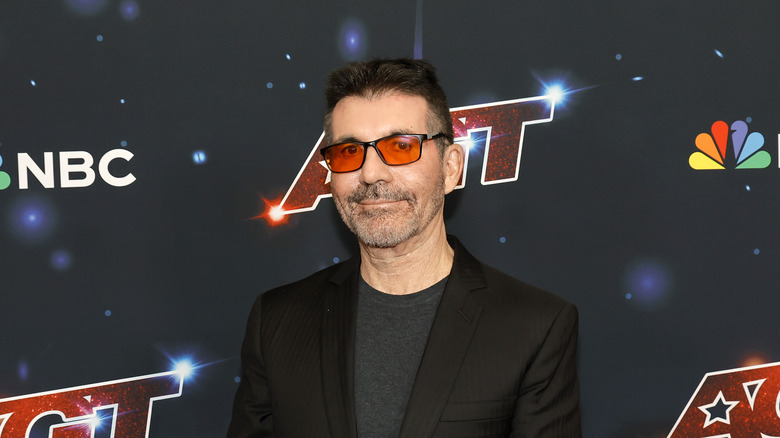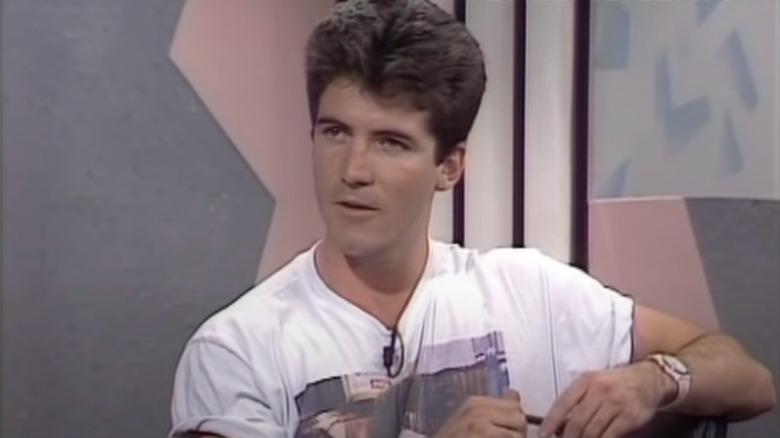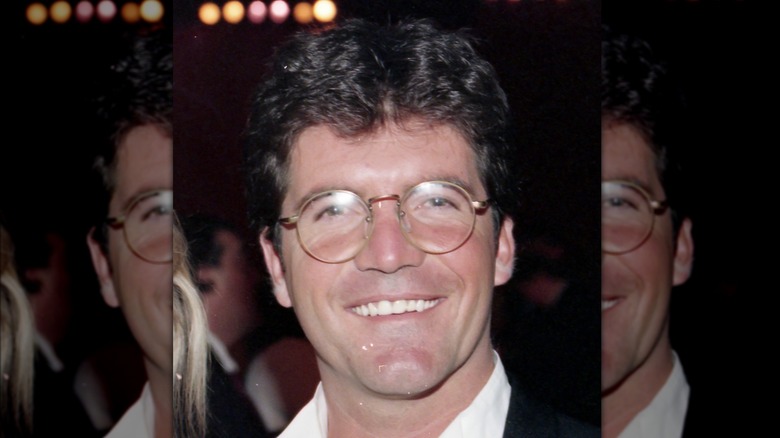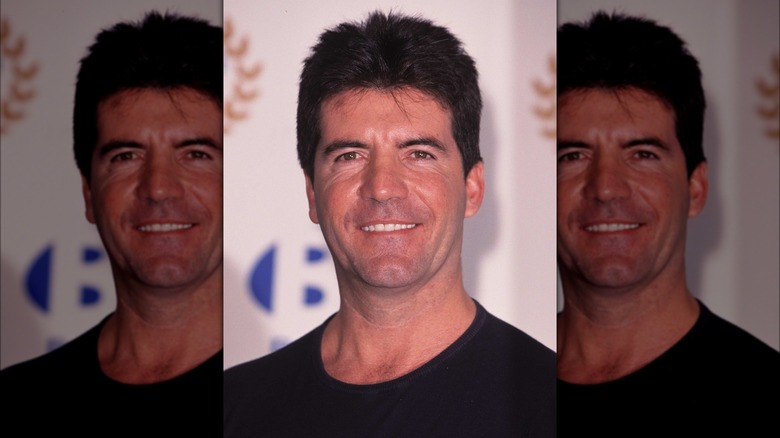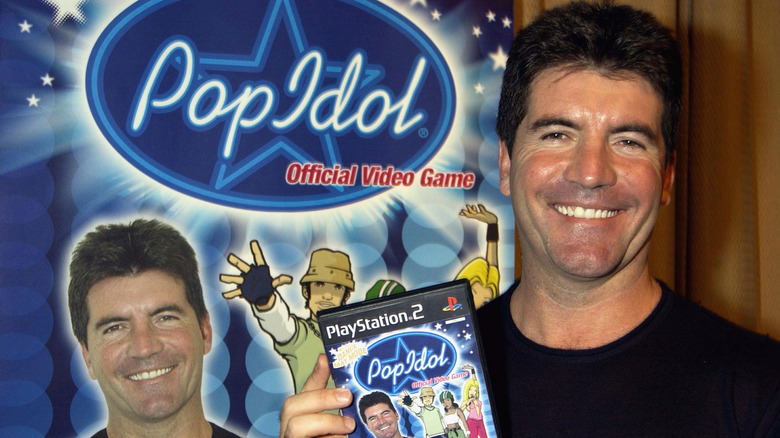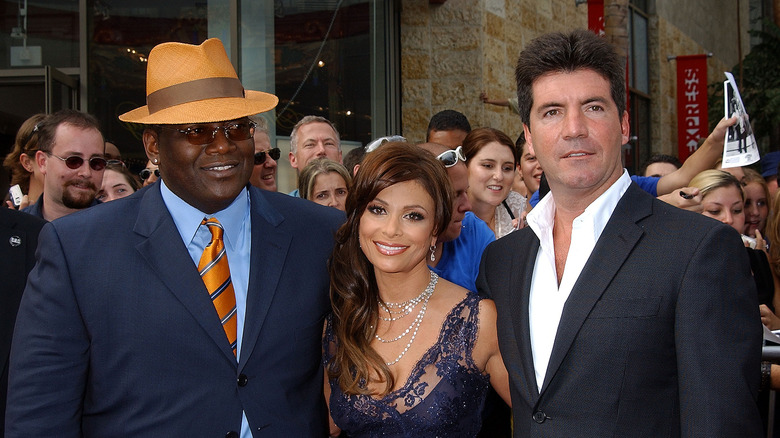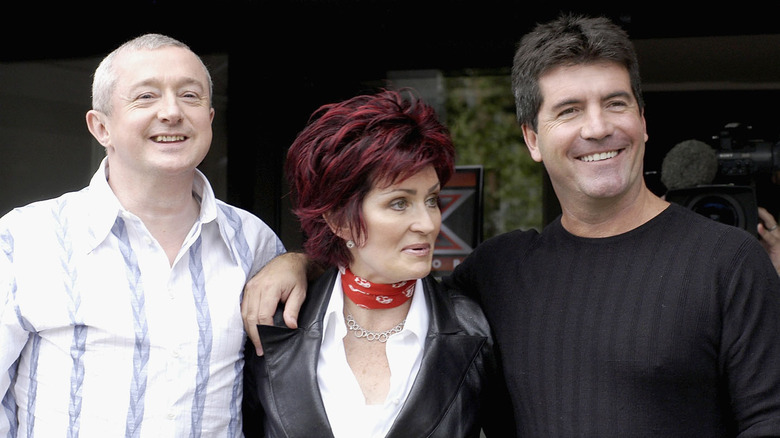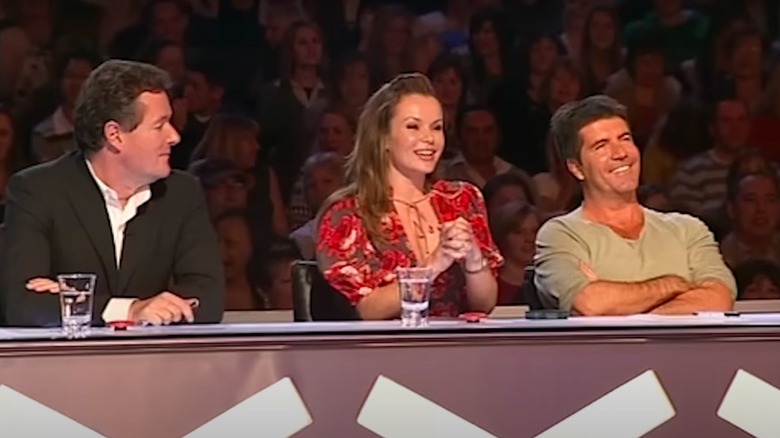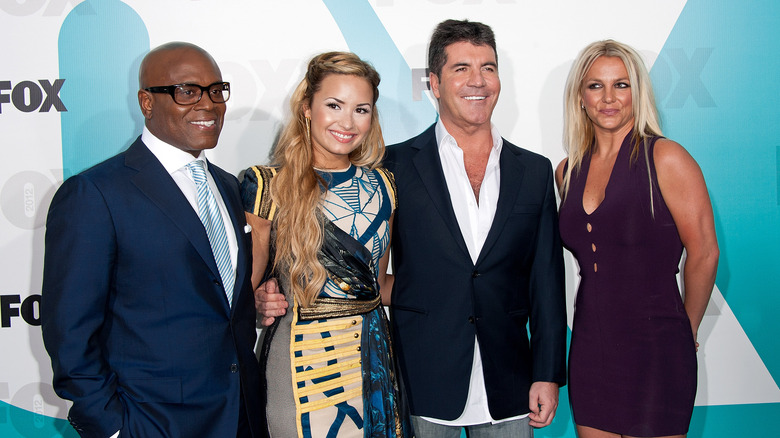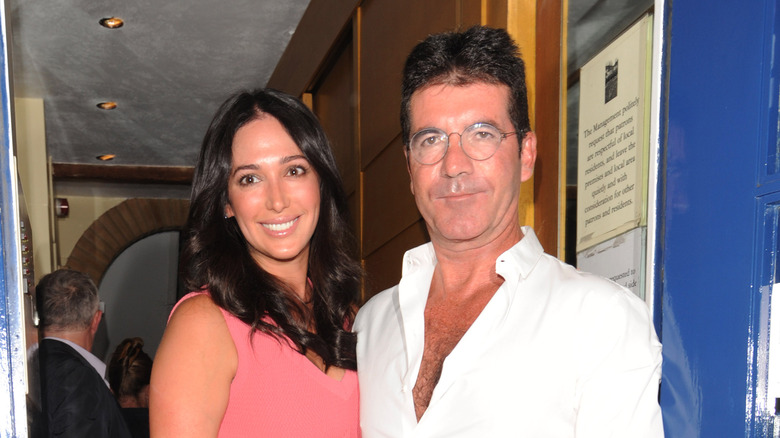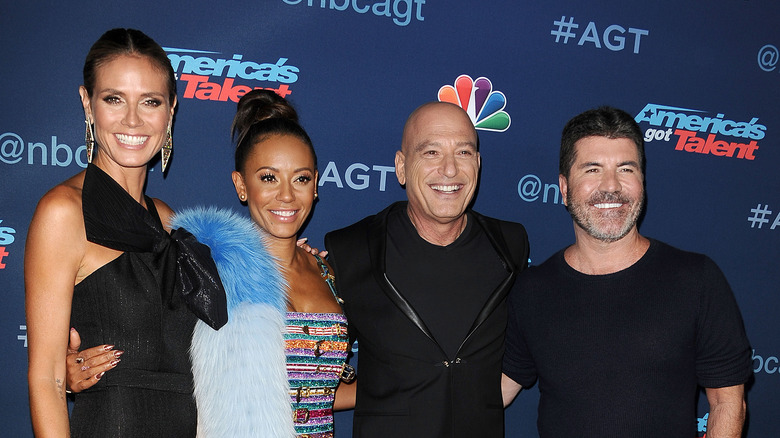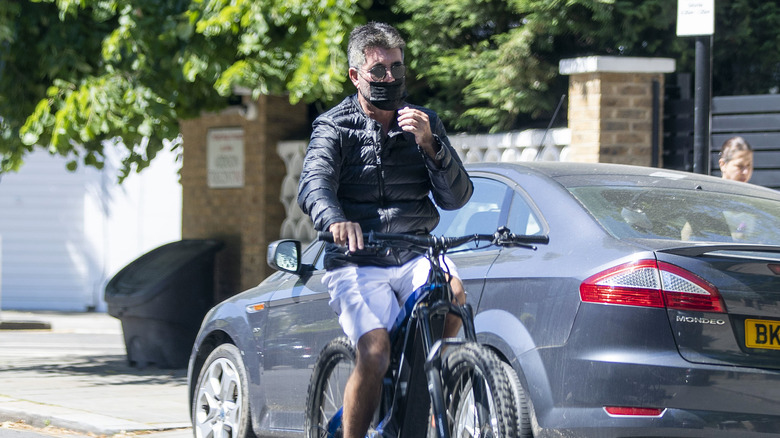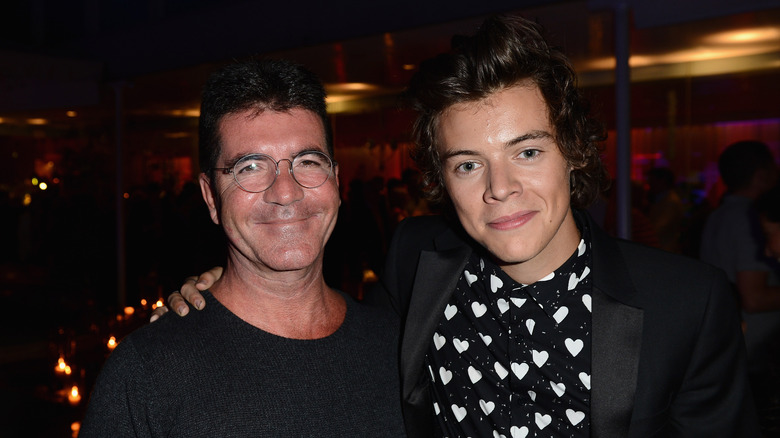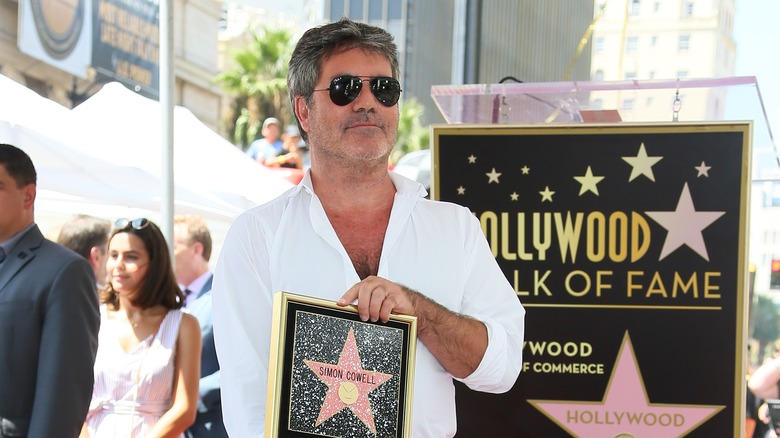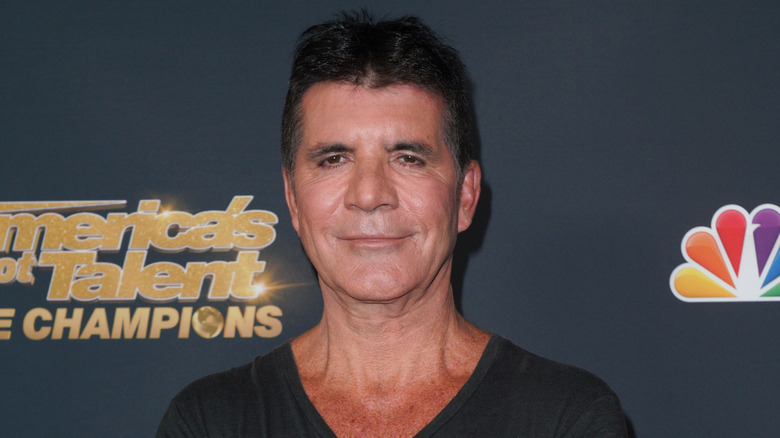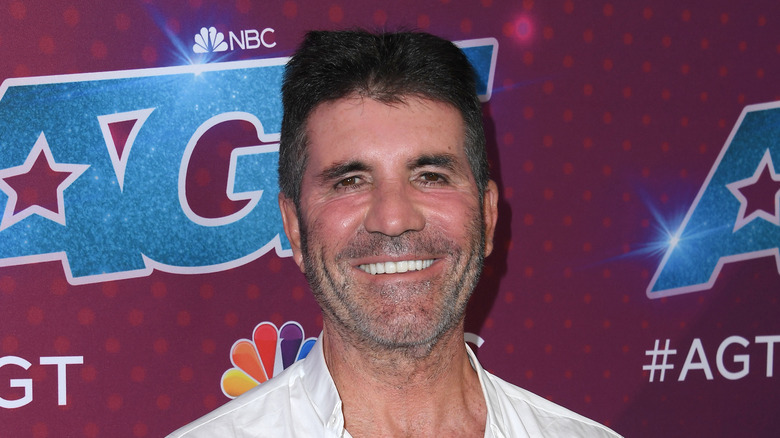Simon Cowell's Transformation Has Him Looking Unrecognizable
When Simon Cowell first appeared on British television back in the early 2000s, he was a music industry executive. Before long he was a bona fide television star, who's since appeared in numerous television talent competitions over the years. He's also a multimillionaire mogul, producer (of both records and TV shows), and arguably one of the world's saltiest on-camera TV personalities — all the more impressive, given that Cowell has managed to achieve stardom on two continents, on American TV and back home in his native U.K.
So famous has Cowell become that he was once offered his own talk show on American television. He agreed to do it, but then changed his mind when he was hit with the reality of what the gig entailed. "I got to the point where they built the set and I started to get anxious and then really stressed out, and I just walked out [of] the meeting," Cowell told E! News. "I just said I literally couldn't do this. I just couldn't talk to people all day long. I'm not very good at talking."
Despite that declaration, talking is what propelled Cowell to fame in the first place, sharing his caustic, cutting comments while judging performers on one of the umpteen shows on which he's appeared over the years. To learn more, keep on reading for a look back at his extraordinary journey, with photos taken over the years making it clear that Simon Cowell's transformation has him looking unrecognizable.
He rebelled during his posh and privileged childhood
Simon Cowell was born in 1959. His father, Eric Philip Cowell, was an executive in the music industry, while his mother, Julie Brett, was a ballet dancer and socialite. Simon was a tempestuous youngster; even he's acknowledged that, as a child, he was a handful and a half. "I was drinking and smoking at eight, and I once nearly burned the house down," he told The Sun. "I was trying to prove to my brother that Father Christmas wasn't real, so I found the costume and set fire to the beard."
He also developed a habit, when playing Monopoly, of flipping over the board whenever the game didn't go his way. Asked about that behavior during an interview with GQ, Simon stood by his poor sportsmanship. "It's the worst feeling in the world," he said, "and you know you've still got a couple of hours to go of utter misery. Just tip the board up."
That rebellious nature came into play when he was sent to Dover College, a prestigious boarding school. Simon, however, didn't feel it was a good fit, and at age 16 dropped out. Simon's father eventually got him a job in the mailroom of famed British record label EMI, which eventually led him to become assistant to an A&R exec, and then a talent scout, paving the way for a career in the music biz.
His foray into the music business nearly bankrupted him
Simon Cowell left EMI during the early 1980s to form E&S Music with his boss at EMI, Ellis Rich. The company created several hits, but Cowell eventually decided he needed to leave. In 1985, he entered a partnership that launched an independent label, Fanfare Records. After some initial success, the company hit a rough patch financially, which grew so dire that it about forced Cowell into bankruptcy. "Once I started to make some money, I bought a Porsche, bought a house," Cowell told Fortune. "By the time I was 28, I was broke and I had to go back and live with my parents."
As humbling as that setback was, Cowell picked himself up and landed another gig, working as an A&R consultant for BMG Records. This time, Cowell approached things a bit differently, embracing a new slow-and-steady strategy after the hard lesson he'd learned. "I wanted everything to happen overnight," he admitted. For the next few years, Cowell built his career at BMG, steadily and methodically, as he became increasingly successful and influential within the company.
Success as a London music exec thanks to novelty songs
As Simon Cowell made his mark at BMG, he began gravitating toward novelty acts. This led Cowell to produce the 1993 musical oddity "Wrestlemania: The Album" for WWE, in addition to top-selling albums from puppet duo Zig and Zag, and the Teletubbies. Cowell also experienced success in legitimate pop music, signing such acts as Five, Westlife, and Sonia. In fact, during his time with BMG, Cowell's acts sold more than 150 million albums, with 70 singles hitting the U.K. charts.
One of Cowell's most successful sparks of inspiration came after the characters played by actors Robson Greene and Jerome Flynn performed an impromptu cover of The Righteous Brothers' "Unchained Melody" on their TV show, "Soldier Soldier." Cowell smelled a hit, and tracked down the actors so he could entice them to record the song as a single. Neither, however, was interested — but Cowell was relentless. "I drove them so mad that I actually got a solicitor's letter from one of them saying I had to stop harassing his client," Cowell recalled while appearing on "Oprah Winfrey's Masterclass" (via the Daily Mail).
Cowell then contacted Robson's mother, badgering her to convince him to sign on. They did, and that record wound up going to No. 1, staying there for seven weeks. Robson & Jerome, as this new musical act was dubbed, went on to record several singles and albums, experiencing more success in music than they had as actors.
Unexpected TV stardom with Pop Idol
In 2001, Simon Cowell and Spice Girls manager Simon Fuller joined forces to devise a new TV talent competition. (Funny enough, a few years before, Simon Cowell turned down an opportunity to work with the Spice Girls.) On the series, aspiring singers would be evaluated by a panel of experts, with contestants eliminated until just one was left standing (Fuller owned the format, while Cowell had ownership of the recording rights for the winner). As Cowell explained during an appearance on CNN's "Larry King Live," they initially pitched the show to American television networks. Most were not interested. "I never expected it funny enough to be on American TV," Cowell said.
Returning to England, they then shopped the project around. ITV expressed interest, and "Pop Idol" made its debut in December. The series caught fire, becoming a surprise hit with ratings growing exponentially each week as viewers became increasingly invested in the singers. When the finale aired in February 2002, nearly 14 million British viewers tuned in — representing 59% of total viewership, bringing ITV its highest ratings in years. Meanwhile, it was estimated that 8.7 million people voted via telephone.
That runaway success was not lost on the U.S. networks that turned down the show. During a 2002 appearance on British chat show "This Morning," Cowell was asked about bringing "Pop Idol" to American television. "I think it's the right thing to do," he said. "It might be fun."
Mr. Nasty conquered America with American Idol
Among those entranced by "Pop Idol" was Elizabeth Murdoch, daughter of Rupert Murdoch, who convinced the media magnate to snap up the format and replicate it on his Fox network. A judging panel was assembled, including '80s pop star Paul Abdul and record producer Randy Jackson. Producers also wanted Cowell, but he was initially reticent. "I thought ... 'I've done it once in England. Let somebody else do it,'" Cowell said on "Larry King Live." "And then I was eventually talked into it."
Expectations were low when the show — renamed "American Idol: The Search for a Superstar" — debuted in the summer of 2002. "American Idol" proved to be a monster hit that went on to dominate television for more than a decade, and Cowell was its undisputed star. American viewers, in fact, had never quite seen anyone like "Mr. Nasty" (as he'd been dubbed by the press), whose withering put-downs of untalented singers were beyond scathing. "There are only so many words I can drag out of my vocabulary to say how awful that was," he told one contestant."To another hopeful, he said, "You actually sing like a train going off the rails."
A staggering 23 million viewers — a massive number for a summertime show — tuned in to watch Kelly Clarkson declared the show's first winner. "American Idol" became the year's highest-rated new series, while subsequent seasons averaged 30 million.What's more, "American Idol" made Cowell a lot of money over the years.
A new direction on U.K. television with The X Factor
By 2004, "American Idol" continued to rise in popularity. Back in his native England, Simon Cowell announced plans to launch a new TV singing competition. Dubbed "The X Factor," the format was nearly identical to the "Idol" format (judges critiquing singers) with two key differences: the contestants would be winnowed down into three teams, each of which would be guided by one of the judges; and the competition was open to people of all ages, ditching the "Idol" 16-28 age limit. "Hopefully we're going to be able to appeal to somebody over the age of 35 who keeps saying to me there aren't any artists I like in the competition," Cowell told BBC News. "It's amazing, but we haven't catered for older record buyers who want to buy into the new Cliff Richard or whatever."
At the judging table, Cowell rehashed his "Idol" shtick, delivering brutal takedowns of singers who weren't up to snuff. He was joined by Sharon Osbourne — a hot commodity thanks to the success of MTV's "The Osbournes" — and Irish music manager Louis Walsh, known for overseeing the careers of such popular British acts as Westlife and Boyzone.
When "The X Factor" made its debut on British television, ratings were strong — and just got stronger in subsequent years, climbing to more than 19 million viewers by 2010. Sadly, all good things must come to an end; in 2021, ITV canceled the show after 17 years.
Another U.K. hit with Britain's Got Talent
In 2006, Simon Cowell was flying high, with "American Idol" a major hit in the U.S., and "The X Factor" burning up ratings in the U.K. That was when he pitched ITV another competition series, which he called "Britain's Got Talent." Once again aping the "Idol" format, this show expanded beyond singers to include all types of acts, ranging from comedians, to ventriloquists, to dancers, to magicians, and more. Cowell produced a pilot, in which he and Piers Morgan judged. "ITV didn't want it, nobody wanted it, but somebody from NBC in America heard I was making a pilot, met with me in L.A. and literally bought the show in the room," Cowell recalled for a British documentary "The Talent Show Story" (via Bella Online). That led to the 2006 premiere of "America's Got Talent," in which Cowell was executive producer but, for a change, not a judge. When "AGT" proved to be successful, ITV reconsidered, and in 2007 launched "Britain's Got Talent" — with Cowell ensconced behind the judging table alongside Morgan (who was also judging on "AGT") and actor Amanda Holden.
Cowell's winning streak continued, with "Britain's Got Talent" and "America's Got Talent" both becoming hits in their respective countries. Meanwhile, the format has been utilized in nations all over the world, ranging from Albania to Vietnam. In 2014, Guinness World Records declared "Got Talent" to be the most successful reality television format on the planet.
The X Factor flopped on American TV
In 2010, Simon Cowell exited "American Idol" after the end of its 9th season — in order to launch a U.S. version of his Brit hit "The X Factor" the following year. "[I] didn't think it was right to do two shows in America at the same time, so [I] decided to leave one and start another," he explained to journalists during an appearance at the Television Critics Association press tour, reported CNN. Joining Cowell at the judging table were music producer Antonio "L.A." Reid, Pussycat Dolls' Nicole Scherzinger, and fellow "American Idol" alum Paula Abdul. In season two, Cowell shook things up by firing host Steve Jones and ousting judges Abdul and Scherzinger. He brought in singers Demi Lovato and Britney Spears; Khloé Kardashian and Mario Lopez were tapped to host. For the third season, Spears and Reid exited, replaced by Destiny's Child star Kelly Rowland and Mexican pop star Paulina Rubio.
The new show caught a lot of heat, ranging from criticism of Kardashian's abysmal hosting skills (she was fired after just one season), to an admission that autotune was used to enhance contestants' vocals. "The X Factor" was canceled after three seasons (the U.K. version, however, continued for many more seasons).
Interestingly, "The X Factor" may be poised for a comeback. In a 2022 interview with "Access Hollywood," Cowell revealed he wasn't opposed to reviving the show — and if he did, it would be in the U.S., not the U.K.
He scandalously fathered a child with his friend's wife
During his years as a successful TV star, Simon Cowell reportedly had an active love life. Among his many girlfriends were singer Sinitta, model and TV host Terri Seymour (whom he dated from 2002 until 2008), makeup artist Mezhgan Hussainy (they got engaged in 2010), and former "Baywatch" star Carmen Electra.
In 2004, Simon met Lauren Silverman, wife of his close friend, real estate developer Andrew Silverman. They remained friendly over the years — so much so that rumors surfaced in 2012 that they were having an affair (at the time, Simon's lawyer issued a statement of denial). The following year, however, People reported that Simon and Lauren were expecting a child together; understandably, the Silvermans began divorce proceedings. "This is a very sensitive issue and all media enquiries are being dealt with by his U.S. attorney," a rep for Simon said at the time. In 2014, Simon and Lauren welcomed a son, Eric Philip Cowell. Unsurprisingly, parenthood changed Simon Cowell.
In 2021, after being with Lauren for about a decade, Simon Cowell had some more happy relationship news: he proposed. "They are both super happy," a source told People of the now-engaged couple. "They've been together a long time now and adore each other so it's not a huge surprise to their close friends." Of the relationship's scandalous origins, Simon told the Daily Mail in 2015, ""I'm not proud of the circumstances. I can't hold my head up about it."
He replaced Howard Stern on America's Got Talent
When "The X Factor" was canceled in 2014, Simon Cowell suddenly found himself in an unusual position; for the first time since the start of "American Idol" in 2002, he had no presence on American television. An opportunity presented itself in 2015, when radio legend Howard Stern exited "America's Got Talent," after serving as a judge since 2012. It was later announced that Cowell would be stepping in, marking his first time as a judge on "AGT." (When Sony Pictures' computers were infamously hacked in 2014, emails emerged in which Cowell was allegedly scheming to replace Stern — for which the radio host has attacked Cowell repeatedly over the years). When the 11th season premiered, Cowell joined existing judges Mel B, Howie Mandel, and Heidi Klum.
As Cowell explained in an interview with The New York Times, judging on "America's Got Talent" felt simultaneously foreign and familiar, but he quickly fell into a groove. "I was really confident until I sat in the chair and you kind of go, 'Oh God, this is a big show here.' I'm used to being on big shows, but I'm thinking, 'I really hope this is going to work.' And for about 10 seconds, I felt nervous. And then this 83-year-old woman in a leotard came on and stood on her head and sang the national anthem and I said, 'You know what, I'm home.' And I never looked back."
A devastating injury from a freak accident
In 2020, Simon Cowell was enjoying some down time in Malibu when he decided to take his new electric bicycle out for a spin. It didn't go well. "Simon has broken his back and will be having surgery this evening," Cowell's rep said in a statement to People, revealing that Cowell fell off the bike on his property, coming down right on his back.
Cowell was hospitalized, and underwent emergency surgery on his back, which was far from minor. "It was a five-hour surgery and he has had to have a number of fusions and metal rod put into his back," a source told People. After surviving the accident that nearly paralyzed him, Cowell had to take a break from work. "America's Got Talent" brought in a fill-in judge for Cowell.
The reality TV veteran addressed his injury during an interview with People ahead of his return for the 2021 season. "I've got to be honest with you, it wasn't that bad actually breaking your back," he said. "I mean it wasn't great for three-four weeks but after that you get through it." In addition, he joked, he'd been doing so much physiotherapy after the surgery that he felt he was in better shape than he was prior to being injured. "I had to do so much exercise now," he added. "I actually feel better than I did before the accident."
He's launched some major stars
During the course of two decades on British and American television, Simon Cowell has been responsible for launching the careers of numerous stars. It was during his tenure on "American Idol," for example, that viewers were first introduced to Kelly Clarkson, Clay Aiken, Carrie Underwood, Jennifer Hudson, Fantasia Barrino, Chris Daughtry, Katharine McPhee, Kellie Pickler, Jordin Sparks, and Adam Lambert. Meanwhile, the U.K. version of "The X Factor" was responsible for discovering Leona Lewis, girl group Little Mix, Olly Murs, and One Direction; the U.S. version launched Fifth Harmony.
Cowell has also been successful at finding stars on his "Got Talent" shows. "Britain's Got Talent" is responsible for the career of Susan Boyle, while the U.S. version can lay claim to discovering comedian Melissa Villaseñor (who went on to join "Saturday Night Live"), singers Jackie Evancho and Grace VanderWaal, and ventriloquist Terry Fator, the latter of whom continues to draw big crowds in Las Vegas.
As Cowell explained to "Extra," the fact that all those stars have emerged from his various television shows is proof that "Idol," "X Factor," and the "Got Talent" franchise have accomplished the goals he'd set out for them. "That's probably the thing I'm most proud of is that the shows we've made have gone on to do what we intended them to do, which is more than be a TV show," he said.
He's earned recognition and made a fortune as a Hollywood heavyweight
Simon Cowell may have arrived in America via "American Idol" in 2002 as an unknown, but two decades on he's one of the most famous people on television. He's also earned numerous accolades celebrating that mammoth success. That was evident in 2004, when he was named as one of the Time 100 — an honor that was repeated a few years later, in 2010.
Also in 2010, Cowell was presented with the BAFTA Special Award at the British Academy Television Awards. Meanwhile, on the other side of the pond, he's received five Emmy nominations — all for his role as judge on "American Idol." In 2018, he received his own star on the Hollywood Walk of Fame. "Why did this take so long?" he joked at the ceremony, as reported by Variety. "If anyone says fame is a bad thing, I don't know what you're talking about. It's the best thing in the world."
Beyond the awards and honors, becoming a television star has also made Cowell ridiculously wealthy; his net worth, in fact, has been estimated at approximately $600 million. Not one penny of that fortune, by the way, will be inherited by his son. "I'm going to leave my money to somebody. A charity, probably — kids and dogs," he once said in an interview with the Mirror. "I don't believe in passing on from one generation to another."
His changing looks sparked speculation of plastic surgery
In recent years, Simon Cowell's facial appearance has changed, in much the manner of a Real Housewife, or one of those Hollywood stars who suddenly emerges looking completely unrecognizable.
Not surprisingly, Cowell's seemingly altered facial features have led to much speculation that he's had a nip or tuck along the way. "Simon Cowell's drastically different face," screamed a headline in Express, while a 2023 Instagram video resulted in a flood of comments from fans expressing concern. "What on earth has happened to your face?" wrote one commenter, while another added, "Too much Botox."
Speaking with Radar, aesthetic Injector Kristina Kitsos — who confirmed she'd never treated Cowell — shared her opinion about what was going on. "Simon Cowell has had too much Botox in the lateral forehead, causing the sides of his eyebrows to droop down like that," she said. "I strongly advise my clients to do a little and add to it if necessary, therefore they look rested and natural. This is definitely a case where less would have been more."
He denied plastic surgery but admitted he went 'too far' with facial fillers
Simon Cowell is not unaware of all the plastic surgery speculation out there, and has taken to having a sense of humor about it. That was evident during the 2023 season opener of "Britain's Got Talent," when hosts Ant & Dec (a.k.a. Anthony McPartlin and Declan Donnelly) cheekily addressed the rumors. "We have a new face joining the judging panel," Donnelly told viewers, with McPartlin quipping, "What? Simon has a new face?"
Interviewed by the Mirror about the hosts' jab, Cowell laughed it off. "I think it's hysterical," he said. "I mean, it just makes me laugh. I haven't had a facelift or anything. I've had a bit of Botox or whatever, but nothing drastic. So when I hear about this stuff, honestly it does make me laugh."
That wasn't the first time that Cowell had commented about his face. Speaking with The Sun in 2022, he confirmed that he used facial fillers, but conceded that he may have overdone it. "There was a stage where I might have gone a bit too far," he confessed. "I saw a picture of me from 'before' the other day, and didn't recognize it as me first of all ... Eric [his son] was in hysterics. Enough was enough. There is no filler in my face at all now. Zero."
